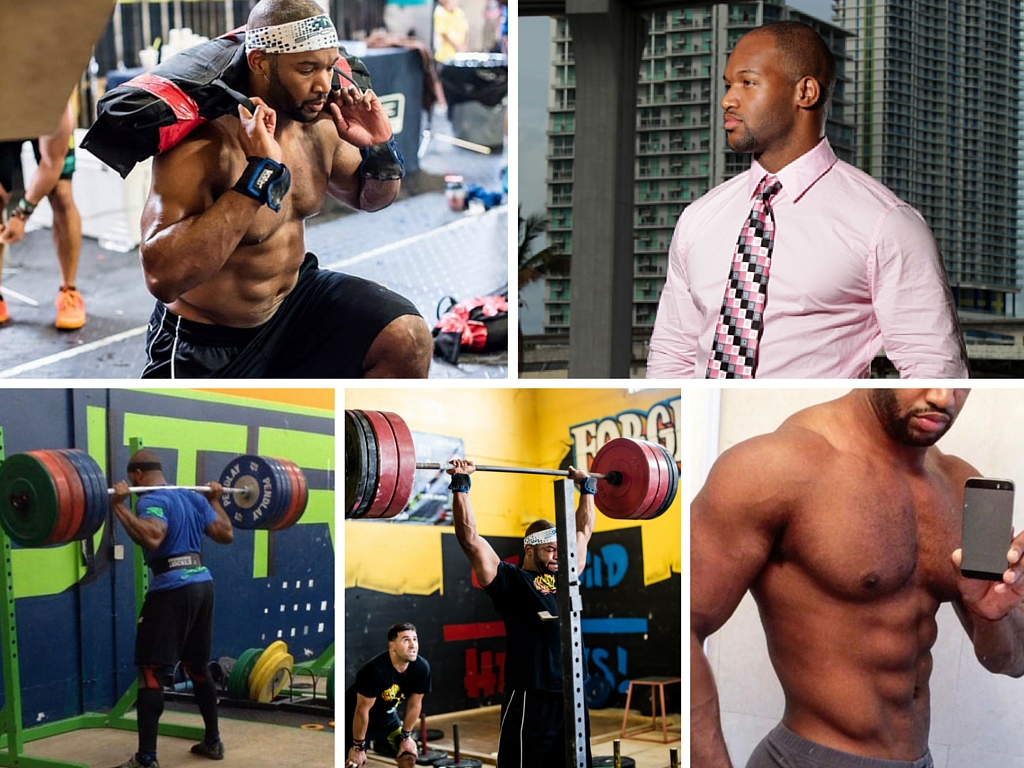The supplement industry can be a strange, scary place, and for athletes, navigating products and formulations can be a confusing process. But there’s at least one “inside man” who’s using his own experience as a competitive athlete and lifter to bring some clarity to the industry — and hopefully produce better supplements in the process.

A former college football linebacker, Dustin Elliot works at NutriForce Nutrition in Miami Lakes, Florida. When he’s not splitting time between the research & development lab and working with their brands’ sponsored athletes, Elliot is busy pursuing his on athletic career. After years of sport-specific strength & conditioning and dabbling in competitive fitness and CrossFit, Dustin took up powerlifting in late 2014 and found immediate success in local competitions. Now, he’s got his sights set on moving up the ranks and is already ranked first in his USA Powerlifting weight class for South Florida.
His competition bests include a 535 squat, 350 bench, and a 622 deadlift in the 105 kilogram class, all drug tested and unequipped. We caught up with Dustin to find out how his impressive knowledge in the lab influences his training, and vice versa.
How did you get into the supplement industry? What products have you worked on from the research & development side?
I started as a sales rep and a rookie member of the Betancourt formulation team back in 2009. At that time I was doing everything from traveling from territory sales, expos and putting together shipments to managing the books and reviewing formulations. I started from the bottom so that I could learn the ins and outs of the industry as I began to work closer with brand managers and the chemists from the quality control department.
I’ve been the primary for formulations for all of the NutriForce Sports and Betancourt Nutrition products. My position is unique in that I also handle a lot of the media for these companies as well, and I work on everything from the formulas to the flavoring to the packaging. So I see the product through from start to finish as opposed to just writing down the formula so to speak.
Tell us a little about your athletic background. How has that influenced your interest in fitness and nutrition?
I’ve always played football (outside linebacker) and run track (110 hurdles and the triple jump). It was the strength and conditioning program at the college level that turned my interest towards fitness and nutrition. After playing football I got a job at a sports nutrition store which furthered my interest into sports nutrition science. I currently compete for USA Powerlifting, which incorporates drug testing, and I finished 3rd in the Southeast at 105kg last year (1st in South Florida).
A video posted by Dustin Elliott (@the_real_dstunner) on
Would you say your knowledge of nutritional and fitness science influences your training? If so, how?
It does, with my strength and conditioning background I’m able to put together my own plan for periodization and can practice better discernment when picking exercises. On the nutritional side of things I’m able to maintain a diet that provides the adequate nutrients and macronutrients for recovery and supporting strength without an excess of empty calories so I can remain in the same weight class.
When it comes to sports nutrition, my ability to review and assess the scientific studies that have been done on sports nutrition ingredients allows me to incorporate only the things that are right for my training. Right now I find that whey protein, creatine, and a bioavailable curcumin (among other things) are ideal.
What might surprise people about the supplement industry from an insider’s perspective?
What may be surprising to most people is the disparity in attention to detail and quality between a major brand and a smaller brand. The industry has a bad reputation due to companies looking to make a quick buck or companies that are willing to risk a user’s health for the sake of having a product make a splash in the industry. The level of sophistication, cleanliness, reporting, and research that’s done at a facility like NutriForce Nutrition’s is not very common in this industry.
A video posted by Dustin Elliott (@the_real_dstunner) on
What are some common training and nutrition mistakes folks keep making despite research evidence to the contrary?
- Sitting on machines expecting gains in muscle mass. It’s been known for a long time that free weight, multi-joint exercises are ideal for hypertrophy (increase in muscle fiber dimensions).
- Mixing steady state cardio with heavy strength training. This has become pretty commonplace at many gyms, but the best way to reach your goal is through specificity in your training protocol.
Tied for 1st in the squat at 529lb. #PowerLifting#USAPL #squat #500 club
A video posted by Dustin Elliott (@the_real_dstunner) on
- Eating too few calories to lose weight. It’s best to gradually restrict calories so you can maintain energy levels and a healthy metabolism. Cheat meals should also be incorporated to maintain compliance, support healthy thyroid function, and create a caloric deficit for further weight loss once you’ve plateaued.
- Not attempting HIIT (High Intensity Interval Training) cardio for fat loss. Many people still rely on steady state cardio, but high intensity cardio causes spike in anabolic hormones, and research has shown a correlation between this and improvements in body composition. Howeve, the more direct link deals with fatty acid recruitment from high intensity exercise and caloric expenditure form the post exercise oxygen deficit that is created.
- Avoiding supplements. Legal over the counter supplements today have all their ingredients coming from foods that are already found in our diets. They are simply concentrated to promote exercise performance and recovery. Supplements like creatine, whey protein, fish oil, curcumin and vitamins are proven to provide benefits for active individuals.